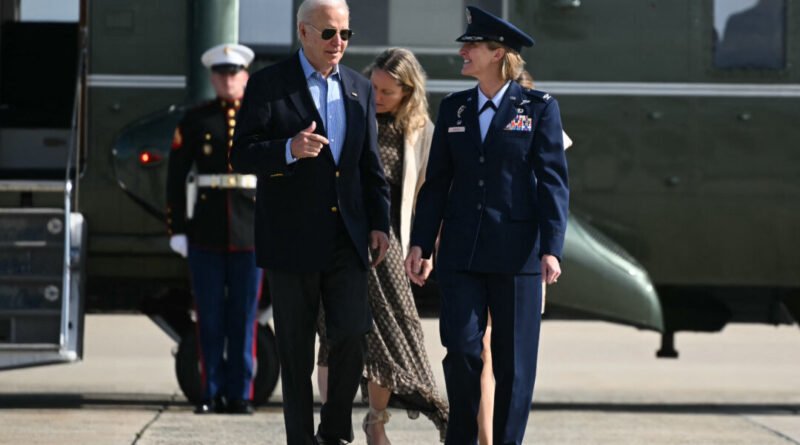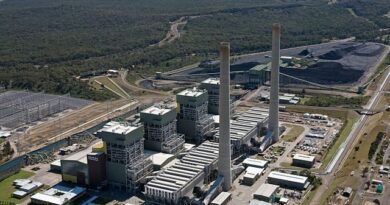Biden Makes Second Visit to Europe for G7 Summit and Talks with Zelenskyy
President Biden is set to sign a bilateral security agreement with the Ukrainian president in Italy during the leaders’ summit.
PUGLIA, Italy—President Joe Biden is traveling to Europe on Wednesday to participate in the Group of Seven (G7) Summit, set to take place in southern Italy from June 13–15.
The summit will convene in Puglia, also known as Apulia, a region situated at the heel of Italy’s boot-shaped peninsula, renowned for its historical significance, sandy beaches, and olive oil production.
Leaders from the world’s most advanced economies—the United States, Japan, Germany, the United Kingdom, France, Italy, and Canada—will come together for the three-day summit.
Italian Prime Minister Giorgia Meloni is hosting this year’s event at the luxurious Borgo Egnazia hotel resort, a favorite spot for celebrities like Madonna, Justin Timberlake, and David Beckham.
President Biden’s journey to Italy follows his recent five-day visit to France, where he honored the 80th anniversary of D-Day and engaged in bilateral discussions with French President Emmanuel Macron.
In an election year, the G7 summit holds great significance for President Biden. Similar to his visit to France, he is expected to emphasize the importance of alliances and oppose isolationism, a stance often used to criticize his predecessor, former President Donald Trump.
In April, the Vatican confirmed that Pope Francis would join the leaders’ summit, taking part in a special session focused on artificial intelligence (AI).
“This marks the first time in history that a pontiff will participate in a G7 event,” Ms. Meloni stated on April 26.
It is uncertain whether President Biden will meet with the Pope during the summit.
World leaders anticipate addressing a variety of topics during the 50th summit, including conflicts in Ukraine and Gaza, frozen Russian assets, economic security, AI, migration, climate change, and food security.
Frozen Russian Assets
The G7 leaders are expected to announce a plan to unlock frozen Russian sovereign assets to assist Ukraine, a cause championed by the United States for some time.
Prior to the crucial summit, G7 finance ministers discussed the legality of using around $250 billion worth of frozen assets in European accounts as collateral for providing a reconstruction loan to Ukraine. France was initially hesitant about the plan.
Before departing France last week, President Biden announced an agreement with Mr. Macron on utilizing the frozen Russian assets.
The proposed plan involves using the profits, particularly the interest earned, from these assets as collateral to furnish Ukraine with a loan through a sovereign lender. The spotlight will be on Italy this week if the G7 leaders can finalize the details of this proposal.
White House national security adviser Jake Sullivan, speaking to reporters on Air Force One en route to Italy, mentioned ongoing discussions on unlocking Russian assets.
“We view those discussions as productive and progressive. I have no announcements to make today, but I believe we are making strides,” he said.
Biden–Zelenskyy Meeting
Another significant aspect of the G7 sidelines will be the meeting between President Biden and Ukrainian President Volodymyr Zelenskyy. Following their meeting, the leaders intend to sign a bilateral security agreement.
The agreement does not entail a commitment to deploy U.S. forces to defend Ukraine, clarified Mr. Sullivan. Instead, it aims to ensure that Ukraine possesses the requisite physical capacity, intelligence, and other capabilities to effectively protect itself.
Both leaders scheduled a press conference for Thursday to address the media post their meeting.
This follows the bilateral discussions between President Biden and Mr. Zelenskyy last week in Paris, France, coinciding with the D-Day commemorations.
During the June 7 meeting, President Biden apologized to Ukraine’s president for delays in passing a foreign aid measure containing $61 billion in support for Ukraine.
“We are committed to supporting you,” President Biden assured Mr. Zelenskyy, announcing $225 million in new aid for the nation in turmoil.
Last year, President Zelenskyy made a surprise visit to the G7 in Japan. This year, he is expected to urge G7 countries to commit to increased funding. Therefore, the decision on the Russian assets will be crucial for the Ukrainian president.
From 1998 to 2014, Russia was part of the Group of Eight (G8). However, the country was suspended after annexing Ukraine’s Crimea region.
Key Priority: Artificial Intelligence
Ensuring the ethical development and use of AI is a key focus for the Italian leader at this year’s summit. A special session on AI is planned, where the Pope will deliver a speech.
The Vatican initiated the “Rome Call for AI Ethics” several years ago, with support from major companies like Microsoft, IBM, and Cisco.
Ms. Meloni has voiced concerns about AI’s risks, particularly its impact on the job market, suggesting it could lead to job displacement and income inequality.
Tackling AI risks is crucial as it contributes to disinformation, foreign interference, and election manipulation, stated Greg Allen, director of the CSIS Wadhwani Center for AI and Advanced Technologies.
Recently, Open AI, a leading AI company, revealed that Chinese and Russian propaganda services were utilizing Open AI’s ChatGPT service to produce propaganda messages at a minimal cost, Mr. Allen disclosed in a CSIS press briefing before the summit.
He also highlighted the growing use of AI in global political campaigns to create synthetic content like images, videos, and audio to disseminate high-quality misinformation.
Response to China
During last year’s G7 summit in Hiroshima, Japan, China’s economic coercion was a primary focus.
In 2023, the G7 leaders publicly condemned China as an economic aggressor, warning that such behavior would not be tolerated by the international community and signaling potential consequences.
Concerns over China’s tactics that undermine international norms, particularly in the context of industrial overcapacity, are expected to be a point of discussion at the 2024 summit.
Chinese companies have been rapidly capturing market share in strategic sectors like solar panels, wind turbines, steel, and electric vehicles, sparking alarm from U.S. and European governments over China’s extensive government subsidies that contribute to industrial overcapacity. The implications on industry development and innovation in other countries are a major worry.
“The U.S. is concerned about the influx of goods from China, surpassing the previous ‘China shock,’ and is rallying allies and partners to adopt a more protective stance,” Ms. Benson expressed during the CSIS brief.
It remains to be seen if the tariff rates on Chinese imports within the G7 will be aligned closer, she added.
The European Commission announced the imposition of additional tariffs of up to 38.1 percent on Chinese electric car imports starting in July.
According to Mr. Sullivan, the G7 nations agree on the need to collaborate in addressing the challenges posed by China’s policies and practices.
The summit ensues the European Parliament elections last Sunday, which shifted the political landscape in Europe.
Significant gains were made by right-wing parties in the election, particularly in France, prompting President Macron to announce the dissolution of the French parliament and call for snap elections.
The White House is confident that this political advancement will not impact President Biden’s relations with European leaders.





